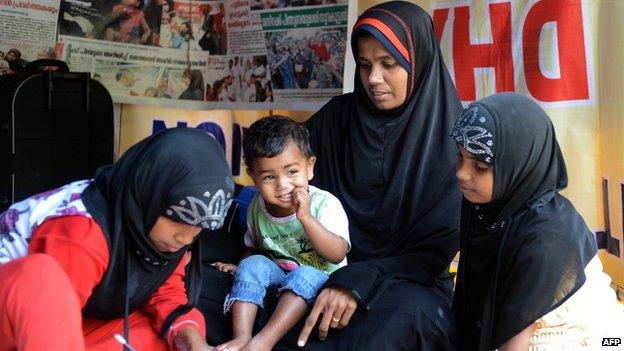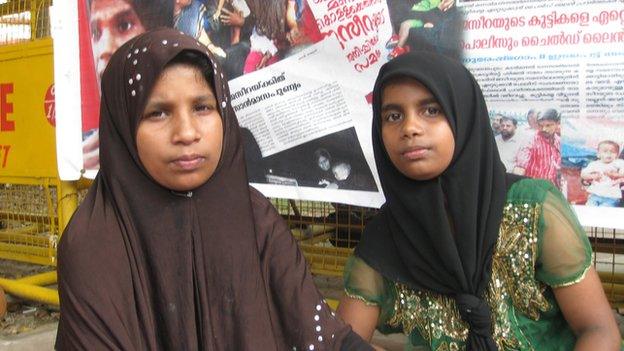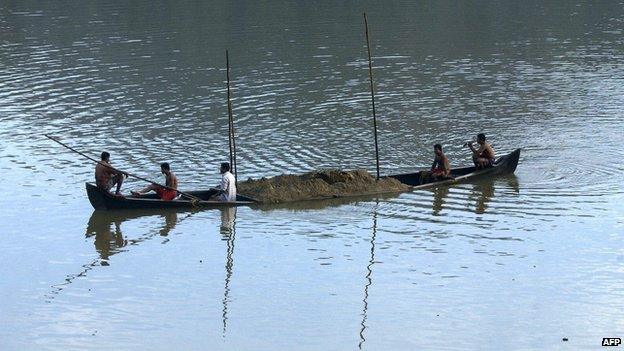Indian woman fights against sand mining in Kerala village
- Published

Jazeera V has been taking part in the protest in Delhi along with her three children
Jazeera V has travelled more than 2,000km (1,243 miles) from her home in the southern state of Kerala to the Indian capital, Delhi, where she has been taking part in a protest for two months against sand mining in her coastal village.
Since 6 October, she has been squatting outside the Kerala House, the official building of the Kerala government near the 18th Century Jantar Mantar observatory, along with her three children.
She says she will not move until the government promises to protect the shoreline of Pazhayangadi river in Kerala's Kannur district.
Covered in a black veil, the 31-year-old says she did not set out to become an environmental activist.
"Two years ago, I returned to my ancestral home in the final months of my pregnancy when I was shocked to see the receding shoreline," she says.
Her complaint to the authorities about trucks quarrying sand illegally in the area went unheeded and pitted her against the "sand mafia".
"Even though I was pregnant, the sand mafia beat me up. When I turned to regional newspapers for help, they said I was mentally disturbed and accused me of seeking publicity," she alleges.
Distraught, she sat on a protest at a local police station and more recently, she spent two months camping in front of the secretariat in the state capital, Trivandrum.
'Lack of support'
"I did not know what I was doing was called a 'strike'; the press told me so. I did not even know that the beach was part of an 'environment' until environment activists said so. I was just sad to see the negligence by administrators."
River sand mining is banned in Kerala, but reports say it goes on unchecked.
Jazeera's activism, she says, stems from the lack of support she received while growing up.

Some are questioning whether Jazeera's protest is impacting the education of her two daughters
"I belong to a conservative Muslim family. My brothers did not allow me to go to the beach alone. I was not allowed to go on a swing. Because I was a girl, I was not allowed to read a newspaper. When boys played outside, I would watch from the window and feel sad."
She regrets she could not complete her education - she was taken out of school just after she went into the tenth grade and at 17, she was married to a man who did not allow her to listen to the radio, watch television, read a newspaper or a storybook.
"Occasionally, I'd sneak in old comic books and I felt like I was doing something worse than watching a porn film. If my husband found the books, he'd tear them up or burn them," she says.
Unable to live with the constraints, she ran away from home with her elder daughter and became a domestic worker in Ernakulam city. She worked as a door-to-door saleswoman and later as a sales agent for a publishing firm. "That's when I started to interact with the outside world."
Then, Jazeera decided to become an auto-rickshaw driver so she could continue exploring the world. "After being shut inside the house, I wanted freedom and to interact with the outside world and talk to people."
'Blown out of proportion'
When she returned to her hometown, she faced a backlash from male auto-rickshaw drivers there. "They told me that being a Muslim woman, I should not drive a vehicle. I think they were just jealous because I was getting more passengers."
Questioned about the impact of her environmental work on her family life, Jazeera says: "If we focus only on our own house, child or family, we will lose sight of the environmental wonders that have been given to us. It's not right if everyone just looks after their own matters."
She credits her second husband, a religious school teacher she married in 2011, for supporting her cause. "He wanted to marry me because he had heard of my boldness."

River sand mining is banned in Kerala, but reports say it goes on unchecked
While Jazeera's protest against illegal sand-mining has drawn support from the press and civic groups, the top government official in Kannur feels the issue has been "blown out of proportion".
"An inquiry conducted after Jazeera's complaint found only a few women taking sacks of sand to their homes," says Rathan Kelkar.
"The local people are agitated that we have set up a police picket there and that they are being portrayed as criminals."
Jazeera's protest in Delhi, however, is beginning to show some results.
India's Rural Development Minister Jairam Ramesh has written to Kerala Chief Minister Oommen Chandy asking him to take steps to end Jazeera's "pitiable plight".
The National Human Rights Commission too has sent a notice to the state and district authorities to explain why there was no "tangible result" after Jazeera's protests in Kerala.
The panel also questioned whether Jazeera was neglecting the education of her two older children.
Jazeera defends the decision to bring along her children to Delhi.
"Three days of missed classes can be made up for in two days. But, if you take one sack of sand and mix it with cement, it will not come back as sand on the beach."
- Published18 August 2013
- Published6 August 2013
- Published2 August 2013